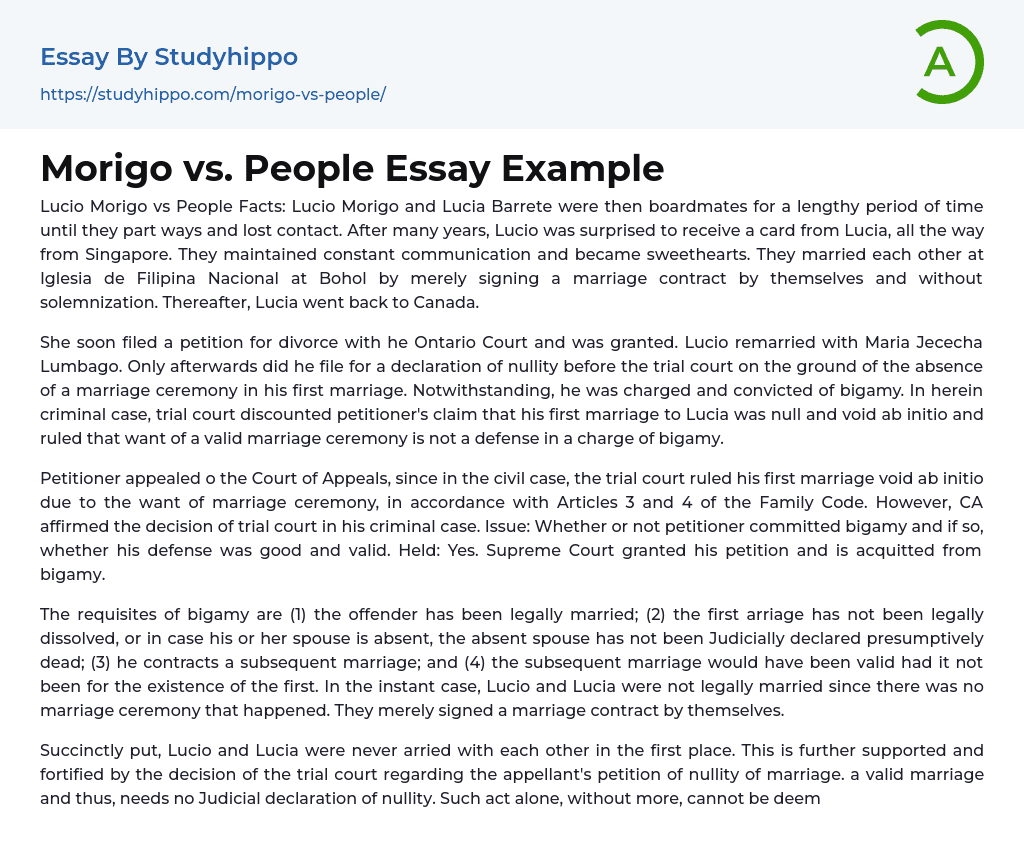Lucio Morigo and Lucia Barrete were once roommates for a long time until they went their separate ways and lost touch. However, after several years, Lucio received a card from Lucia, who was now in Singapore. They started communicating regularly and eventually became a couple. They got married at Iglesia de Filipina Nacional in Bohol by signing a marriage contract without any formal ceremony. After that, Lucia returned to Canada.
After obtaining a divorce from the Ontario Court, she promptly remarried Lucio to Maria Jececha Lumbago. However, Lucio later decided to seek an annulment in court, alleging that his first marriage did not have a proper wedding ceremony. Despite this argument, he was convicted of bigamy. The criminal trial court dismissed Lucio's claim that his initial marriage to Lucia was invalid from the start and
...declared that the lack of a valid wedding ceremony could not serve as a defense against a charge of bigamy.
The petitioner appealed to the Court of Appeals following the trial court's declaration that their first marriage was invalid due to the absence of a marriage ceremony, as mandated by Articles 3 and 4 of the Family Code. Nevertheless, the Court of Appeals affirmed the trial court's ruling in their criminal case. The main concern was whether or not the petitioner was guilty of bigamy and if their defense held any merit. Ultimately, the Supreme Court granted the petitioner's appeal and cleared them of the charge of bigamy.
To engage in bigamy, the individual must fulfill certain conditions. Firstly, they must have participated in a lawful marriage. Secondly, the initial marriage should not have been legally terminated or
presumed deceased if the spouse is absent. Thirdly, they enter into a second marriage. Lastly, the second union would be valid if it weren't for the existence of the first one. In this specific instance, Lucio and Lucia did not undergo a legal marriage as no official ceremony took place; instead, they solely signed a marriage contract.
To summarize, the trial court's decision regarding the nullity of marriage petition confirms that Lucio and Lucia were never married. The court found that there was no valid marriage, eliminating the requirement for a judicial declaration of nullity. Without this declaration, any future marriage entered into by the petitioner would not be considered valid and could lead to charges of bigamy.
- Jurisprudence essays
- Social Injustice essays
- Juvenile Justice essays
- Business Law essays
- Contract essays
- Consumer Protection essays
- Property essays
- Ownership essays
- Agreement essays
- Common Law essays
- Contract Law essays
- Justice essays
- Security essays
- Tort Law essays
- United States Constitution essays
- Crime essays
- Lawsuit essays
- Treaty essays
- Family Law essays
- Marijuana Legalization essays
- Constitution essays
- War on Drugs essays
- Court essays
- Jury essays
- Police essays
- Protection essays
- Community Policing essays
- Criminal Law essays
- Judge essays
- Lawyer essays
- Employment Law essays
- Copyright Infringement essays
- Injustice essays
- Intellectual Property essays
- Breach Of Contract essays
- Internet Privacy essays
- Cyber Security essays
- Bill Of Rights essays
- Civil Liberties essays
- First Amendment To The United States Constitution essays
- Fourth Amendment To The United States Constitution essays
- Second amendment essays
- Animal Cruelty essays
- Law Enforcement essays
- Juvenile Justice System essays
- Surveillance essays
- Forensic Science essays
- Crime Prevention essays
- Criminal Justice essays
- Criminology essays




